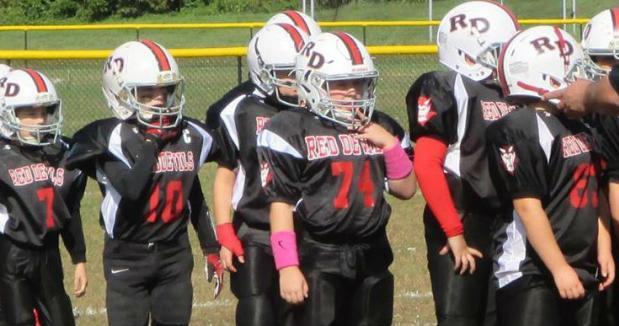September is National Childhood Obesity Awareness Month – Encourage Your Children to Be Active, Play Football

The NFL Play 60 campaign was launched to encourage children to get into shape and combat childhood obesity. Regarding the impetus for the campaign, the Commissioner of the National Football League Roger Goodell said:
“Our players recognize the value of staying healthy and it's important that young fans also understand the benefits of exercise. NFL PLAY 60 is a significant tool in ensuring children get their necessary, daily physical activity.”
Once players reach the professional levels of football they often recognize the importance of physical fitness and work hard to retain their peak athletic condition. However, not all football players are born naturally athletic; many players begin their football career as typical American youth struggling with weight issues.
New York Giants running back Rashad Jennings was one of those children. Throughout youth and high school football, Jennings was relegated to the bench in favor of other players who were in better shape.
Tipping the scales at 270 pounds, Jennings resembled an NFL lineman more than a high school running back.
Overweight and unhappy with his plight, Jennings continued doing what he always did.
"Drinking Sprite and eating M&Ms on the sideline," Jennings said. "Why not? Didn't matter. I wasn't going to get into the game."
It was only when numerous teammates were injured that his coach was forced to use Jennings in a game. On his first touch he ran in a 40-yard touchdown. Even after scoring he did not feel like an integral part of the team.
"I figured I wasn't going to play anymore so I went back to the sidelines with my buddy to eat my M&Ms," Jennings said.
Jennings did get back into the game and scored four touchdowns on a grand total of just 14 plays. Two of those touchdowns came on defense. As fate would have it, there were collegiate scouts attending the game and they saw the great deal of potential in the overweight athlete.
The fateful moment changed the course of Jennings life and inspired him to become diligent in the classroom and with his weight management.
SEE ALSO: Physical Activity Guidelines for Americans: Youth Physical Activity Recommendations
However, Jennings is not the only other player currently in the NFL who endured a similar childhood. The Pittsburgh Steelers nose tackle Daniel McCullers once weighed 270 pounds as a 12-year-old and ballooned to 420 pounds during high school.
McCullers was predisposed to weight issues due to genetics, as his grandfather weighed 400 pounds at one point and his family did not understanding the severe effects of improper nutrition. His grandmother, a fantastic Southern cook, would whip up calorie-heavy feasts three-times a day and fashion an even bigger spread every Sunday.
He did not stop trying to battle his childhood weight issues even as he unwittingly consumed a poor diet.
McCullers tried out for the North Garner Middle School football team and was rejected after only one practice. The coaches indicated that the squad was already full, but McCullers felt there was a different reason.
“I couldn’t run a sprint without dying,” he told Sports Illustrated.
Even though Jennings and McCullers provide inspiration to children who are struggling with weight issues, they are still the exception, not the rule.
The cold hard facts are impossible to ignore, as 1 out of every 5 children in the United States is clinically obese.
SEE ALSO: The starring role football coaches play in preventing obesity in today’s athlete
SEE ALSO: 3 reasons why your child should play youth football
President Obama has proclaimed September as National Childhood Obesity Awareness month.
“This month, we pause to remember our commitment to our Nation’s youth and renew our focus on improving the health and well-being of our country’s most precious resource,” said President Obama.
It is important for all parents, coaches, friends and relatives – as adult stewards of local youth – to encourage children to understand effective dietary habits and above all, get out and play.
